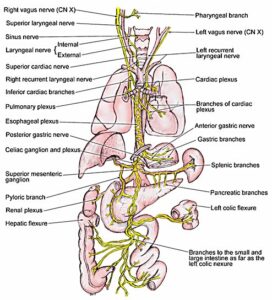Easy ways to keep your vagus nerve working well
– The vagus nerve is one of the most fascinating nerves in the body. It regulates the functions of several internal organs, including digestion, heart rate, respiratory rate, and many other functions like coughing, sneezing, and much more. Just the fact that it regulates digestion makes it one of the most important structures in the body.
It can do all these things because it connects directly to the brain (as cranial nerve X or 10) and carries signals down through the head and neck and through the thoracic cavity to many of the internal organs. It looks like a massive spider’s web that wanders its way through the upper body. In fact, the word vagus comes from the Latin word for ‘wander’ (not because it was discovered in a casino in Nevada).

Because the vagus is involved with so many functions, if it’s not operating at an optimal level it can cause a lot of problems. Some symptoms of vagus nerve dysfunction include loss of voice or hoarseness, difficulty drinking fluids, loss of one’s gag reflex, ear pain, unusual heart rate, abnormal blood pressure, decrease in stomach acid, acid reflux, nausea or vomiting, and abdominal bloating or pain.
If you notice any of these symptoms, you may have a problem with your vagus nerve and its ability to transmit those signals between the brain and other areas of the body. You may need to go to your doctor to get a vagus nerve stimulator implanted in your chest in order to stimulate the nerve. However, there lots of simple ways to stimulate the vagus nerve that are completely free and easy to do.
One way to accomplish this is the sing! Sing in the car, sing in the shower, sing anywhere. The people close to you may or may not love to hear your singing every day. But tell them you do it in order to stay healthy and happy. Maybe, they’ll understand. 🙂 Besides, it’s free!

The reason why singing helps to stimulate the vagus nerve is because, in addition to sending brain signals to many internal organs, it provides motor innervation to many of the muscles affecting the pharynx, the soft palate, and the larynx. It also affects the epiglottis and root of the tongue.
Yes, you can sing, hum, chant, and even gargle to stimulate your vagus nerve and benefit many of the major functions of your body. This also helps to reduce stress. Those that know me well know that I sing and play my guitar nearly every day. I call it “my therapy” (one of many). It’s the first thing I do after washing the dishes every night. Of course, you can sing or hum almost anywhere.
Another area that the vagus nerve affects is the tissue around the external acoustic meatus in the inner ear. That’s why Dr Camden Clay (you’ll remember his name if you took my Muscle Balancing class) and others say you can stimulate the vagus nerve by putting your little fingers in your ears and wiggling them around for a few moments.

It’s not exactly like a “wet willie” but similar. However, you have to be careful to not stick your fingers in too far, and be sure that your fingers and nails are squeaky clean. Also, it’s not a good idea to do this for someone else. Teach them how to do it instead. Let’s fact it: it’s easier to just sing!
For more information about the vagus nerve, its functions, and potential problems, you can check out these pages:
Teach Me Anatomy – the Vagus Nerve
Healthline – Vagus Nerve Overview
Dr Kharrazian – 4 Exercises for the Vagus Nerve
Stay well, John
Ray of Light Training
Member of the Fascia Research Society
John J. Ray is a Board Approved Continuing Education Provider through the NCBTMB
